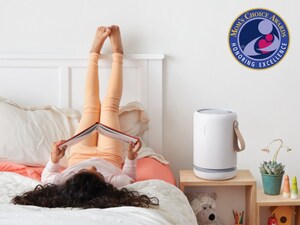
Fall Allergies, Winter Viruses, and Everyday Wellness: Why Air Quality Can't Be Ignored Now More Than Ever
Experts urge people to treat air health as a foundation for resilience during peak allergy and cold season
PALM BEACH GARDENS, Fla., Nov. 12, 2025 /PRNewswire/ -- As fall turns to winter, people prepare for more than just colder temperatures. The coming months mark the height of seasonal challenges: viruses such as influenza, RSV, and COVID-19; and allergens like dust mites, pet dander, ragweed and mold spores as people spend more time indoors. These airborne threats affect not only day-to-day comfort but also long-term health. While most wellness routines focus on nutrition, exercise, and sleep, Molekule experts say air health is the missing fourth pillar of resilience.
According to Dr. Jaspreet Dhau, Vice President of Research & Development at Molekule, a science-led and research-backed air purification company, the air we breathe is often an overlooked factor in managing these health concerns. "Air health is foundational to how we live and perform," said Dr. Dhau. "We spend 90% of our time indoors, yet indoor air can be two to five times more polluted than outdoor air, according to the U.S. Environmental Protection Agency. By ignoring it, we compromise immune strength, sleep quality, and even cognitive performance—things that matter for both children in classrooms and adults at work."
Recent studies underscore this growing concern. Research from the Harvard T.H. Chan School of Public Health found that fine particulate matter (PM2.5) exposure is linked not only to respiratory issues but also to cognitive decline and immune dysregulation. Similarly, the Lawrence Berkeley National Laboratory has documented measurable reductions in decision-making performance tied to elevated CO₂ and poor indoor ventilation—common conditions during the colder months when windows stay closed.
The Hidden Costs of Poor Air Quality
Experts warn that poor indoor air quality does far more than trigger allergies and asthma — it can also affect long-term health and cognitive function. Studies link airborne pollutants to:
- Inflammation and oxidative stress that impairs the body's ability to recover.
- Sleep disruption , as allergy and asthma symptoms often intensify overnight.
- Increased spread of viruses , due to limited ventilation in enclosed spaces during winter.
"Numerous studies have established a strong connection between elevated indoor air pollution and the development of airway diseases, deterioration of lung function, the emergence of respiratory symptoms, and the exacerbation of preexisting airway conditions," Dr. Dhau added. "Air health really is daily health. It should be viewed as essential as nutrition, exercise, and mental well-being."
A Shift in Reframing Seasonal Wellness
Traditionally, families approach seasonal health with a short-term prevention mindset—stocking tissues, disinfecting surfaces, or taking allergy medication. However, Molekule's experts urge a paradigm shift: view air quality not as a seasonal nuisance, but as a core determinant of overall vitality.
"Seasonal wellness is about more than preventing sniffles," and more about "protecting our capacity to focus, learn, and thrive during the months when air quality challenges are at their worst. Just as we prioritize nutrition, exercise, and mental health, clean air must be seen as a pillar of resilience," says Dr. Dhau.
Building on the consensus among healthcare experts, Molekule developed a Healthcare Provider program in collaboration with allergy immunologists, pediatricians, and functional medicine leaders. The initiative is designed to raise awareness about the critical role of air quality for patients.
This new framing aligns with mounting public health research. The Yale School of Medicine has shown that colder air temperatures can suppress nasal immune defenses—making people more susceptible to viruses like rhinovirus and coronavirus—while the American College of Allergy, Asthma & Immunology reports that ragweed pollen affects roughly 23 million Americans each fall, often worsening when outdoor allergens combine with indoor triggers like dust or pet dander.
"We're encouraged to see healthcare professionals spotlighting air quality's role in health and joining the air care evolution - to see clean air not as seasonal, but as essential to everyday wellness," said Liz McGarrity, SVP of Commercial Sales & Marketing at Molekule.
Dr. Cynthia Keller, triple boarded physician (Pediatrics, Integrative Medicine, and Anti-Aging and Regenerative Medicine) from Molekule's Healthcare Provider program weighs in: "large studies show that current pollution levels contribute to 7-9 MILLION premature deaths annually. And it doesn't take a study for me to know that air pollution leads to decreased health and quality of life, even if you aren't one of the unlucky ones. Clean air matters."
Building Your "Air Health" Routine at Home
Everyone, including those without allergies, can benefit from prioritizing air health. Molekule Healthcare experts recommend simple, evidence-based steps to make it a routine part of overall wellness.
- "Prevention is key," says Dr. Claire Smigiel, MD Allergist-Immunologist. Limiting outdoor exposure during peak pollen times, keeping your home clean, and washing bedding regularly in hot water can significantly reduce allergens.
- "Keep track of allergen levels and adjust routines accordingly," advises Dr. Warner W. Carr, MD Board-Certified: American Board of Allergy & Immunology.
- "Allergy conditions vary by region and can change over time," notes Dr. Sonal Patel, MD Double Board-Certified Allergy & Immunologist. Checking local pollen forecasts and taking preventive measures during peak seasons can help manage symptoms. Consulting with a local allergist is also recommended.
- "Invest in effective air purification technology," suggests Elizabeth Tringali PA-C board-certified Physician Assistant, founder at Tringali Vibrant Health, to reduce and remove airborne pollutants and allergens.
Treating air health as a daily habit rather than a seasonal afterthought can foster environments that support better sleep, stronger immunity, and improved cognitive function year-round.
About Molekule
Molekule is redefining health and longevity by focusing on the air we breathe—one of the most critical elements of wellness. With indoor air often 5x more polluted than outdoor air, Molekule's patented PECO technology goes beyond standard HEPA filtration to destroy pollutants like mold, viruses, bacteria, and VOCs at a molecular level. Backed by 25+ years of research, Molekule's FDA-cleared air purifiers are scientifically proven to improve indoor air quality for homes, schools, hospitals, and businesses. It's all part of Molekule's vision: changing the world from the indoors out. Learn more at www.molekule.com.
Contact: Sierra Gardner
Interdependence Public Relations
262-391-3919
[email protected]
SOURCE Molekule







Share this article